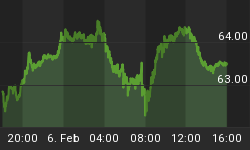If you invest in mining and oil & gas equities, or equities in any financial or industrial sector for that matter, I suggest you pay attention to the issue of country risk in your investment analysis. Not everyone will tell you this.
The reason I think comparatively few people - be they company executives, investment bankers, newsletter commentators, etc. - will 'red flag' country risk is two-fold:
-
First - not everyone views things from 10,000+ feet, thinks conceptually about things, and hence it is likely that not everyone that ought to see the possibility and practicality of prospective escalated country risk has these risks on their radar screen; and,
-
Second - many of the direct and peripheral players in the resource industries have strong, vested interests in investors and traders of resource company shares not focusing on country risk. Hence they either don't talk about it, or if they do they 'sugar coat it'.
A 'credibility statement' with respect to my comments on Country Risk (and my commentaries generally!):
Think about this. Over the past four years I have spent a very significant amount of personal capital and time developing StockResearchPortal.com.
Stock Research Portal's Company Universe includes many companies who operate in developing countries. Accordingly, one might conclude that, by commenting on company and financial markets risks, I am 'shooting myself in the proverbial foot'. I believe independence and objectivity prospectively will be given increasing credit by investors and traders as they separate and rely on independent, objective commentary/analysis from 'vested interest' content. I don't claim the views and opinions I express in these commentaries are always right. I do claim that I write them from an objective, independent viewpoint. I suggest you consider whether you think if I do that, and if you do, consider how valuable that is (or may be) to you going forward.
In recent months I have written, more than once, on newly elected Peruvian President Humala (who took office in late July), and what has been happening in Peru to some of its resident foreign mining companies. Social unrest in a mining community in Peru was reported November 25 in Aspermont's Mining Journal. Titled 'Peru protests targeting Newmont's Conga test Humal' - reading time 2 minutes - the article reports that:
-
Protesters, for a second time in a month, 'attacked' Newmont Mining Corp's Conga project, having earlier destroyed U.S.$2 million of equipment; and,
-
This second November 24 protest apparently blocked roads and shut down schools, businesses and public transport in the city of Cajamarca (560 kilometers northwest of Lima, Peru's largest city).
The article concludes by quoting President Humala as saying, at a Lima based Conference on November 24, "Mining hasn't complied with its social role of attending communities, and that abuse has generated a climate of distrust. That climate divides us between gold or water, and we need to solve that." I suggest you read those words carefully. As developing countries go, from my perspective Peru is far ahead of many of them.
As I see things, developing countries will move continuously forward in, at least, the areas of:
-
local worker safety and working conditions generally;
-
accruing overall economic benefits to their citizens through such things as increased taxation of foreign owned companies and insistence on low-cost or no-cost ownership interests in foreign owned resource projects; and,
-
Enhancement of environmental and climate controls.
If I prove to be right, all these things will increase resource company costs at the expense of the shareholders of those companies - all of which will have to be reflected in lower company share prices than would otherwise be the case.
One of the things I find interesting about the Congo project situation is that, as I understand things, the mine that has been targeted is being jointly developed by Newmont (a Canadian company) and Minera Buenaventura (company website), Peru's largest (according to Aspermont) publicly traded precious metals company. To me, this is a sign that segments of Peru's population are not necessarily targeting just foreign companies. Rather, at least in this case, they are targeting companies operating in their specific geographic areas generally. To me, this enforces the importance of Country Risk to both foreign and local country companies. I think this based on reasoning that local residents must be acting out of concern over their personal well-being as they perceive things in a very broad way, as contrasted to acting because they see 'foreigners' taking from them, or not adequately compensating them for what is being taken. Acting on 'broad principles' strikes me as being more meaningful than acting on 'narrow principles'.
Something to think about - but I strongly recommend you do think about Country Risk in the context of your investments and trades now, and increasingly going forward.















